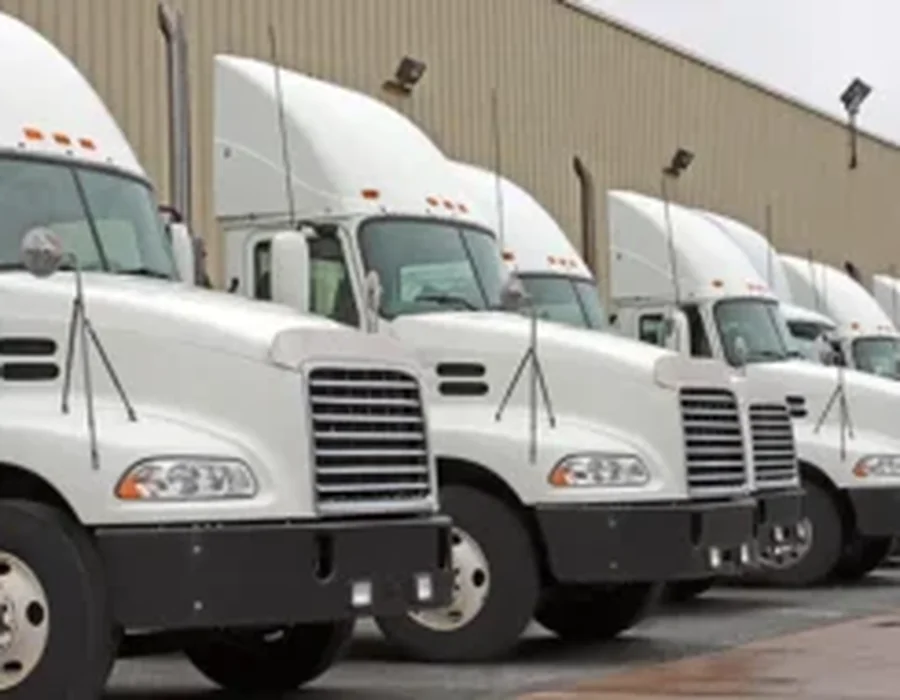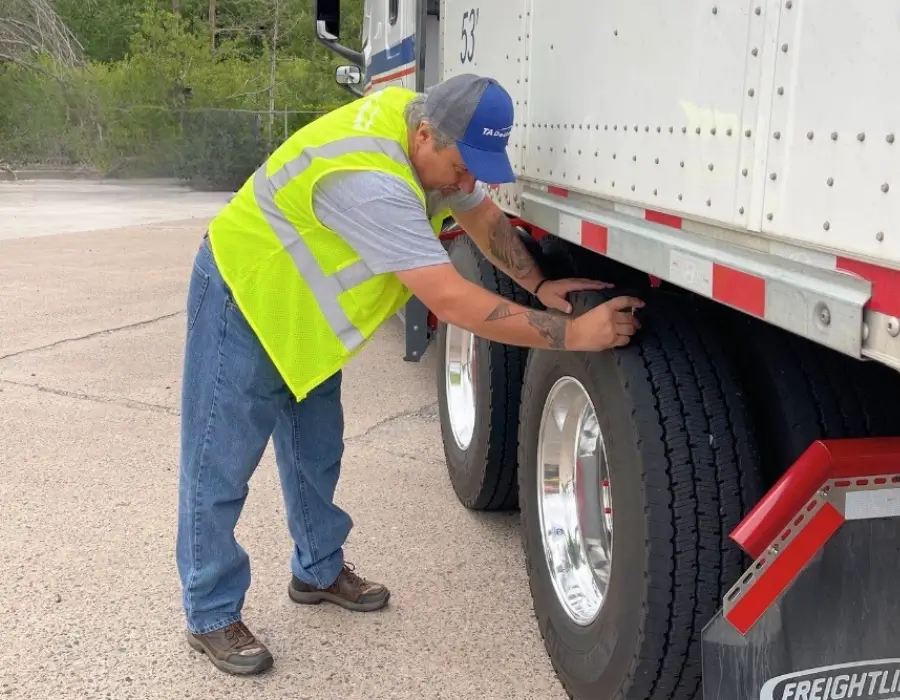Dedicated Carrier Services: Contract Capacity You Control
Get a dedicated carrier that runs on your lanes and standards. With TA Dedicated as your contract carrier, you gain reliable fleet operations for everyday shipments, evolving business needs, and specialty requirements.
Adapt Faster with a Dedicated Carrier
Transportation keeps shifting with new tech, new rules, and tougher carbon targets arrive faster than most shippers can adapt. A dedicated carrier bridges that gap. It blends the flexibility of a third-party fleet with the control of a private one. With TA Dedicated’s up-to-date equipment and compliance expertise, you get smoother operations, full regulatory coverage, and a healthier bottom line.

Advantages of a Dedicated Contract Carrier
Lock In Predictable Costs
Fixed-rate contracts shield you from spot-market spikes, fuel swings, and add-on surcharges, giving you stable budgets and clearer forecasts.
Scale Capacity on Demand
Because your contract capacity can flex quickly for seasonal peaks or sudden demand shifts, you enjoy tighter coverage and controlled costs.
Retain Drivers
Stable schedules improve driver retention, while skills-based onboarding leads to steadier service and fewer handling errors.
Leverage Modern Technology
Live GPS and automated routing feed live performance data that trims idle time and improves on-time metrics.
Lower Liability
We carry compliance, safety, and insurance responsibilities, reducing your exposure to costly claims and fines.
Free Your Team from Fleet Tasks
Recruiting, maintenance, and DOT compliance stay with us—freeing your team to focus on core business, not fleet headaches.
Dedicated Carriers vs Private Fleets vs Third-Party Carriers
| Factor | Dedicated Carrier | Private Fleet | Third-Party Carrier |
|---|---|---|---|
| Cost Predictability | ✓ Fixed contract rates | ✗ Variable internal costs | ✗ Market-driven rate swings |
| Scalability | ✓ Rapid up- or down-scaling | ✗ Slow, capital-heavy changes | ✗ Capacity depends on market |
| Driver Retention | ✓ Consistent, trained drivers | ✗ Turnover tied to demand | ✗ High turnover, new faces |
| Tech & Equipment | ✓ New, customizable fleet tech | ✗ Costly upgrades required | ✗ Generic or outdated tools |
| Risk & Liability | ✓ Carrier carries insurance & compliance | ✗ Shipper bears full liability | ✗ Shared or unclear liability |
| Fleet Management | ✓ Carrier handles all tasks | ✗ Shipper manages fleet ops | ✗ Maintenance standards vary |

How Can a Dedicated Carrier Move the Needle for You?
1. Stabilize Freight Costs
Fixed-rate contracts hold pricing steady and remove spot-market swings.
2. Transition Your Private Fleet
Convert to a dedicated carrier and trade capital expense for managed capacity.
3. Improve Shipment Visibility
Enjoy better tracking with live dashboards that display status, ETA, and dwell time.
Dedicated Contract Carrier Trucking Services
Dedicated Fleet Services
Guaranteed trucks, trailers, and drivers locked to your lanes with fixed-rate coverage.
Dedicated Logistics
Demand planning, volume forecasting, and dynamic routing keep loads aligned with production shifts and last-minute changes.
Back Room & Secure Access
Drivers access secure store areas overnight, staging goods directly in back rooms for easy morning stocking.
Direct DC-to-Store Routes
Deliver freight straight from your distribution center to retail doors, minimizing transfer time and handling.
Unattended Overnight Deliveries
Off-hour delivery windows maximize efficiency, avoid customer foot traffic, and reduce dwell time at store docks.
Fleet & Driver Management
We recruit, train, and maintain the entire fleet so equipment stays road-ready and performance stays high.
How Our Dedicated Carrier Model Works
- Establish Your Freight Profile – We analyze volume, lanes, and service targets to discover hidden costs and new opportunities you might miss.
- Design Your Contract Fleet – Your custom mix of tractors, trailers, and KPIs are locked into predictable rates that match your goals and risk tolerance.
- Onboard Without Disruption – Our managers train drivers on your SOPs, brand the equipment, and roll day-one deliveries without missing a load.
- Watch Performance Live – You can open a dashboard to see ETAs and shipment progress in real time while we fine-tune routes to shave miles and dollars.
- Scale on Demand – Over time, you can add or release trucks in days (not months) so capacity always mirrors demand and budgets stay on track.

Dedicated Support Across Your Transport Network

Specialized Freight Services
Hazmat, temperature-controlled, oversized, or high-value loads ride with trained crews and specialized gear. Each shipment follows strict, load-specific SOPs.

Port & Intermodal Services
We operate beside major U.S. ports and sit on key rail lines. One operator handles drayage and container transfers for better efficiency.

Risk Management
Proactive monitoring, safety audits, and compliance expertise reduce operational disruptions and protect your brand from costly fines, claims, and delays.
Real-Time Tools and Technology Drive Performance
With TA Dedicated as your carrier provider, you gain access to powerful tools that improve visibility, simplify coordination, and deliver on-time performance.
Live Freight Tracking
Real-time GPS and trailer tracking for full visibility across ports, yards, and warehouses.
Performance Dashboards
Power BI dashboards show inventory flow and throughput at a glance.
Digital Inventory Scanning
Barcode scanning tools confirm inventory movement and delivery status.
Driver Communication Tablets
ISAAC in-cab tablets keep drivers and warehouse teams connected in real time.
Dock & Load Planning Tools
Scheduling and load planning software keeps docks organized and freight flowing.
Smart Routing Technology
Real-time route updates keep freight moving despite traffic or delays.
Fleet Monitoring & Maintenance Alerts
Vehicle diagnostics track fuel, performance, and maintenance needs.
Safety System Integration
Onboard systems reduce risk with alerts and real-time monitoring.
Supply Chain Optimization Tools
Logistics tools align freight flow with inventory and production plans.
Nationwide Trucking. Regional and Local Support.
We deliver dedicated carrier coverage across the U.S. From major terminals in Atlanta, Dallas, Indianapolis, and Joliet, TA Dedicated quickly moves freight wherever it needs to go.
- Coverage across the continental U.S.
- Support for regional and national delivery
- Strategic hubs in GA, TX, IN, and IL enable faster routing through the Southeast and Midwest
- Daily lanes along I-75, I-85, I-95, I-10, and I-40 keep freight moving on major interstate corridors
- Consistent service in key metros: Chicago, Atlanta, Dallas, Los Angeles, Philadelphia, Charlotte, and Nashville
- Regional strength in the Ohio Valley, Texas Triangle, Southeast Corridor, and Northeast Corridor

Industries We Serve with Dedicated Carrier Services
Manufacturers, retailers, and 3PLs turn to TA Dedicated for dedicated contract carriage:

Retail
Daily store replenishment, peak season flexibility, and reverse logistics.

Industrial Manufacturing
Freight support for production schedules, inventory turns, and staging.

Energy & Solar
Dedicated capacity for equipment, panels, and infrastructure delivery.

Healthcare & Pharmaceuticals
Secure, trackable delivery for temperature-sensitive and high-value goods.

Construction & Building Materials
Transportation for raw materials, finished goods, and job site deliveries.
Drive with TA Dedicated
You’ll join a team that values your work, gives you consistent, familiar routes, and respects your home time. We build everything on safety—putting your well-being, the freight you haul, and the drivers you share the road with first.

Request a Quote for Dedicated Carrier Services Today
Speak with a TA Dedicated carrier specialist to design your contract capacity. Secure predictable rates, guaranteed trucks, and reduced risk.


